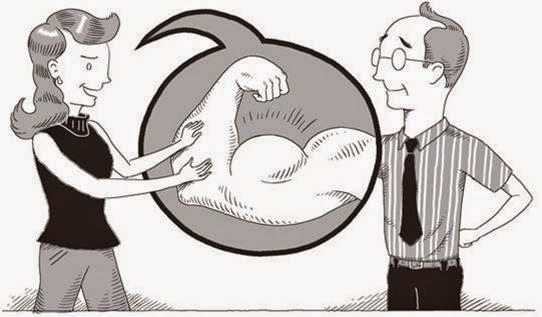An entry to the “The Great Indian Blogging
Contest”, as a part of the Apeejay Kolkata Literary Festival 2015
Links: http://www.aklf.in ; http://www.facebook.com/GreatIndianCircus; http://www.kolkatabloggers.com;
( by Abhimanyu Bishnu;
abhimanyu.bishnu@gmail.com )
Haven’t we all played “praise the boss” at some point during our
career?
(Credit- www.boston .com;
Link-http://www.boston.com/bostonglobe/ideas/articles/2009/11/15/flattery_will_get_you_somewhere)
The topic “The Great Indian Chamcha” (sycophant) is very interesting and relevant, and reminded
me of a famous story:
Akbar the emperor and Birbal were out ,walking, one fine morning,
when Akbar, spotting brinjal growing in the fields, started praising it,
calling it the supreme, most nutritious vegetable. To this, Birbal responded
whole-heartedly, praising it through a poem, pointing out that the brinjal even
had a crown on its head, thus making it the king of vegetables.
Two weeks later, passing by the same field, Akbar had a reversal
of thought, brought on by a recent bout of indigestion after eating brinjal. He
cursed the same brinjal, calling it lowly, nauseating and the worst among vegetables.
Taking the cue, Birbal started deriding the brinjal, calling it a nonsensical
vegetable, unfit for human consumption. This caught the emperor by surprise,
and he asked,” Two weeks back, you were full of praise for this very vegetable.
What has happened now?”
Birbal’s answer was a true gem in the annals of sycophancy, “Your excellency, I am employed in your
service. What does it matter to me as to how the brinjal actually is? I am your
servant, not that of the brinjal."
Welcome to the world of “The Great Indian Chamcha.” “Chamchagiri” ( sycophancy) is a part of our
history and culture; how can we even hope to escape it?
The Wikipedia defines sycophancy as,” flattery that is very obedient, or an indication of deference to another, to an excessive or servile degree.” Whoah! A flowery description for what can be
colloquially termed as “scratch my back”.
Nor is the culture of sycophancy, obsequiousness and genuflection
limited to politics alone. The Great Indian Chamcha exists in schools and
colleges (where exam marks are not strictly based on merit alone), offices (our
so-called “ corporate” culture), social bodies and clubs (the “president’s back
scratching syndrome”), and even our
homes (the “ favourite sibling” syndrome).
I remember one of my ex-colleagues, an imposing, heavily bearded
and moustached man, who would nevertheless turn into a mouse, and run at the
boss’s beck and call. His moustache would quiver and he would shake at the
boss’s reprimand. Annual appraisal times would see him put on the best show,
and true to expectations, his salary hike year upon year, performance notwithstanding,
was very impressive indeed.
On another
level, flattery combined with flirting and seduction is a particularly deadly
combination, and many in the workplace have used this to their advantage.
Of course, I would not hesitate to add that in my own corporate
journey, I have used a bit of “praise the boss” and “follow the boss” for my
own gains, but also backed it up by solid performance.
The late English
premier Benjamin Disraeli, once said, “Everyone likes flattery; and when you
come to Royalty you should lay it on with a trowel.” Successive generations of politicians in our country have merrily taken
this sage piece of advice to heart.
But then, sycophancy has its own flipside to it. For, as the
English author Jonathan Swift, said “Nothing is so great an example of bad
manners as flattery. If you flatter all the company, you please none; If you
flatter only one or two, you offend the rest.”
Facebook
understood the phenomenon of flattery quite early in its journey. Witness the
number of “likes” on Facebook pages, and the people anxiously waiting
throughout the day for these “likes”, and you see what I mean.
At the end of
the day, whether we like it or not, the “Great Indian Chamcha” is here to stay.
If you are eyeing the coveted promotion and incentive, I would sincerely
advise, “Keep the boss happy.” But do
remember to back this up by solid performance. For, if flattery can be likened
to engine oil, performance is indeed petrol, and no matter how well-greased the
engine might be, a half- empty petrol tank would not take your car very far in
the long run.
While on the subject, Hank Ketcham, the
creator of “ Dennis the Menace”, said, “ Flattery is like chewing gum; chew it,
but don’t swallow it.”
All that notwithstanding, here’s to the
“Great Indian Chamcha! ” May his (or her) tribe thrive and flourish, for
without him and his antics, in a world that is already too serious and
schizophrenic, life would truly become dull and devoid of colour for many of
us.

Haha...quite an enjoyable post... liked it... :-)
ReplyDeleteThank you :)
ReplyDelete